中西方文化差异(英文版)90324
- 格式:ppt
- 大小:1.27 MB
- 文档页数:16

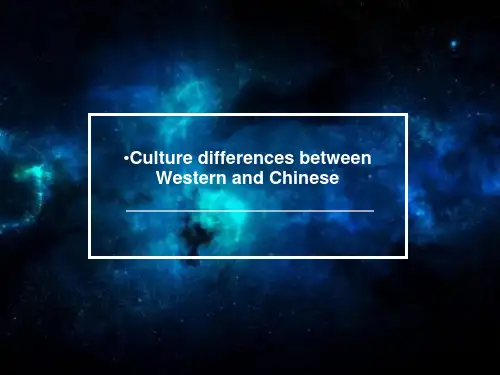

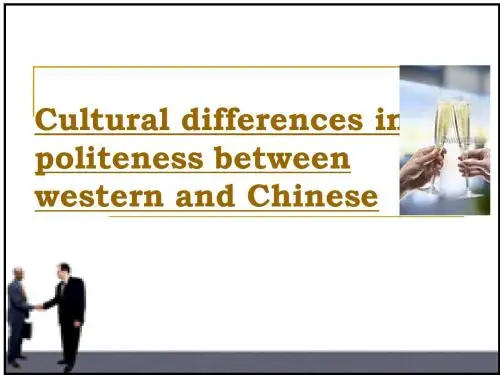
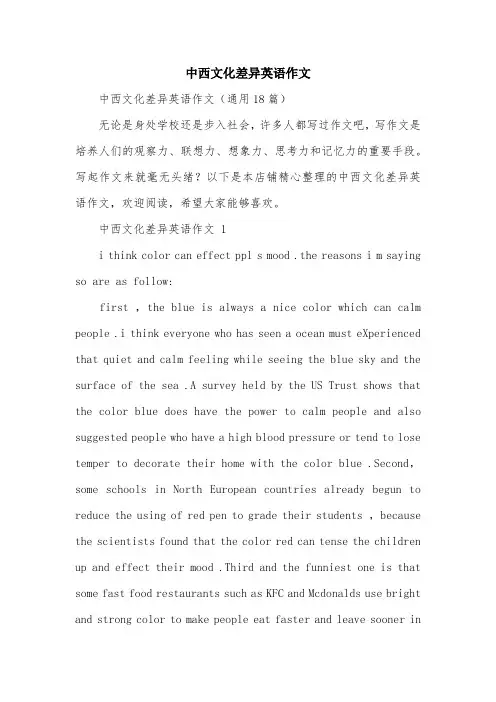
中西文化差异英语作文中西文化差异英语作文(通用18篇)无论是身处学校还是步入社会,许多人都写过作文吧,写作文是培养人们的观察力、联想力、想象力、思考力和记忆力的重要手段。
写起作文来就毫无头绪?以下是本店铺精心整理的中西文化差异英语作文,欢迎阅读,希望大家能够喜欢。
中西文化差异英语作文 1i think color can effect ppl s mood .the reasons i m saying so are as follow:first ,the blue is always a nice color which can calm people .i think everyone who has seen a ocean must eXperienced that quiet and calm feeling while seeing the blue sky and the surface of the sea .A survey held by the US Trust shows that the color blue does have the power to calm people and also suggested people who have a high blood pressure or tend to lose temper to decorate their home with the color blue .Second,some schools in North European countries already begun to reduce the using of red pen to grade their students ,because the scientists found that the color red can tense the children up and effect their mood .Third and the funniest one is that some fast food restaurants such as KFC and Mcdonalds use bright and strong color to make people eat faster and leave sooner inorder to have enough seats and room for more costomers in the busy hours ,because the bright and strong color have this effect on peoples mood..in short ,i strongly recommend people to pay attetion on the colors used around them and to be aware of the effect they made , and i also believe with the further scientific reseaches about colors ,we will use colors more accurate and effective 。
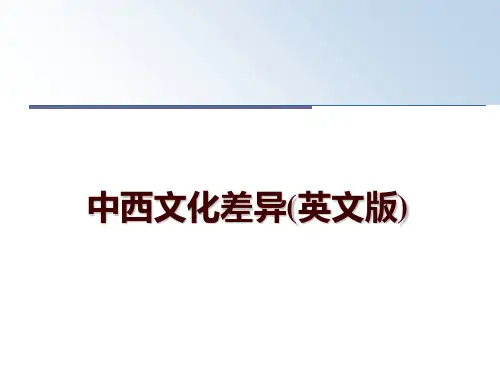
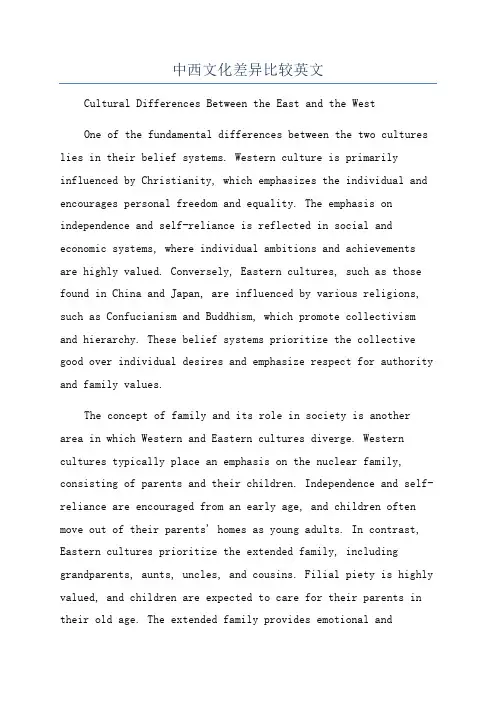
中西文化差异比较英文Cultural Differences Between the East and the WestOne of the fundamental differences between the two cultures lies in their belief systems. Western culture is primarily influenced by Christianity, which emphasizes the individual and encourages personal freedom and equality. The emphasis on independence and self-reliance is reflected in social and economic systems, where individual ambitions and achievements are highly valued. Conversely, Eastern cultures, such as those found in China and Japan, are influenced by various religions, such as Confucianism and Buddhism, which promote collectivism and hierarchy. These belief systems prioritize the collective good over individual desires and emphasize respect for authority and family values.The concept of family and its role in society is another area in which Western and Eastern cultures diverge. Western cultures typically place an emphasis on the nuclear family, consisting of parents and their children. Independence and self-reliance are encouraged from an early age, and children often move out of their parents' homes as young adults. In contrast, Eastern cultures prioritize the extended family, including grandparents, aunts, uncles, and cousins. Filial piety is highly valued, and children are expected to care for their parents in their old age. The extended family provides emotional andfinancial support and plays a significant role in decision-making.。
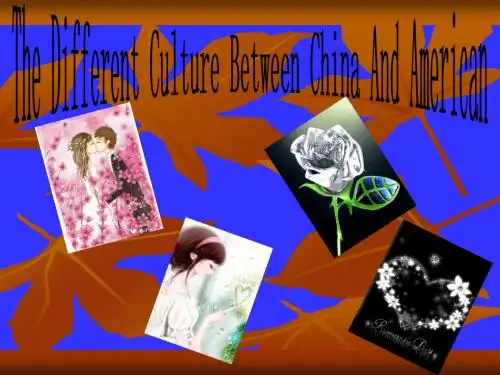
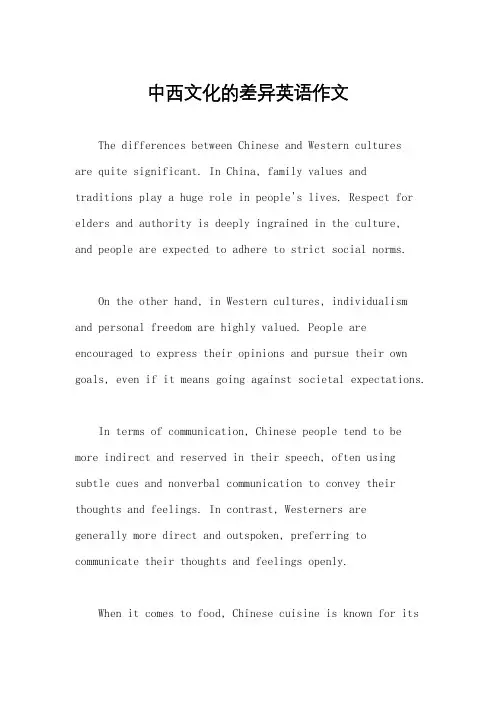
中西文化的差异英语作文The differences between Chinese and Western culturesare quite significant. In China, family values andtraditions play a huge role in people's lives. Respect for elders and authority is deeply ingrained in the culture,and people are expected to adhere to strict social norms.On the other hand, in Western cultures, individualism and personal freedom are highly valued. People are encouraged to express their opinions and pursue their own goals, even if it means going against societal expectations.In terms of communication, Chinese people tend to be more indirect and reserved in their speech, often using subtle cues and nonverbal communication to convey their thoughts and feelings. In contrast, Westerners aregenerally more direct and outspoken, preferring to communicate their thoughts and feelings openly.When it comes to food, Chinese cuisine is known for itsdiverse flavors and use of fresh ingredients. Meals areoften shared family-style, and there is a strong emphasison balance and harmony in the dishes. In the West, there is a wide variety of cuisines influenced by different cultures, and individual portions are more common.In terms of social etiquette, the concept of "saving face" is important in Chinese culture, and people are often careful not to cause embarrassment or loss of dignity for themselves or others. In Western cultures, there is less emphasis on this concept, and people are generally moreopen to discussing and addressing issues openly.Overall, the differences between Chinese and Western cultures are vast and complex, and understanding and appreciating these differences can lead to greater cultural awareness and mutual respect.。
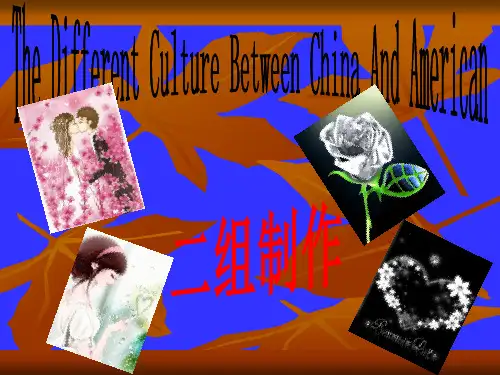

英语作文中西文化差异Cultural Differences between Eastern and Western Cultures。
Culture is a complex and multifaceted concept that encompasses a wide range of beliefs, values, customs, and traditions. It plays a significant role in shaping the way people think, behave, and interact with one another. When it comes to comparing Eastern and Western cultures, there are several key differences that are worth exploring.One of the most prominent differences between Eastern and Western cultures is the value placed on individualism versus collectivism. In Western cultures, individualism is highly prized, and there is a strong emphasis on personal autonomy and independence. People are encouraged to pursue their own goals and ambitions, and there is a strong focus on self-expression and personal achievement. On the other hand, Eastern cultures tend to place a greater emphasis on collectivism, with an emphasis on the needs of the groupover the needs of the individual. People are expected to prioritize the well-being of their family, community, or society as a whole, and there is a strong sense of duty and obligation to the group.Another key difference between Eastern and Western cultures is the way in which time is perceived and valued. In Western cultures, time is often seen as a finite and measurable resource, and there is a strong emphasis on punctuality, efficiency, and productivity. People are expected to adhere to strict schedules and deadlines, and there is a strong emphasis on planning and organization. In contrast, Eastern cultures tend to have a more flexible and fluid approach to time, with a greater emphasis on the present moment and a less rigid adherence to schedules and deadlines. There is a greater emphasis on patience, flexibility, and adaptability, and people are more likely to prioritize relationships and experiences over strict adherence to time.Furthermore, the communication styles in Eastern and Western cultures also differ significantly. In Westerncultures, direct and explicit communication is highly valued, and people are encouraged to be assertive, vocal, and straightforward in expressing their thoughts and opinions. There is a strong emphasis on individual expression and the open exchange of ideas. In contrast, Eastern cultures tend to value indirect and implicit communication, with an emphasis on harmony, respect, and non-verbal cues. People are more likely to use subtle gestures, facial expressions, and body language to convey their thoughts and feelings, and there is a greater emphasis on maintaining social harmony and avoiding conflict.In addition to these key differences, there are also numerous other cultural distinctions that set Eastern and Western cultures apart, including attitudes towards authority, the role of religion and spirituality, and the significance of tradition and heritage. While it is important to recognize and appreciate these cultural differences, it is also essential to approach them with an open mind and a willingness to learn from one another. By fostering a greater understanding and appreciation ofcultural diversity, we can build stronger and more inclusive communities that celebrate the richness of human experience.。